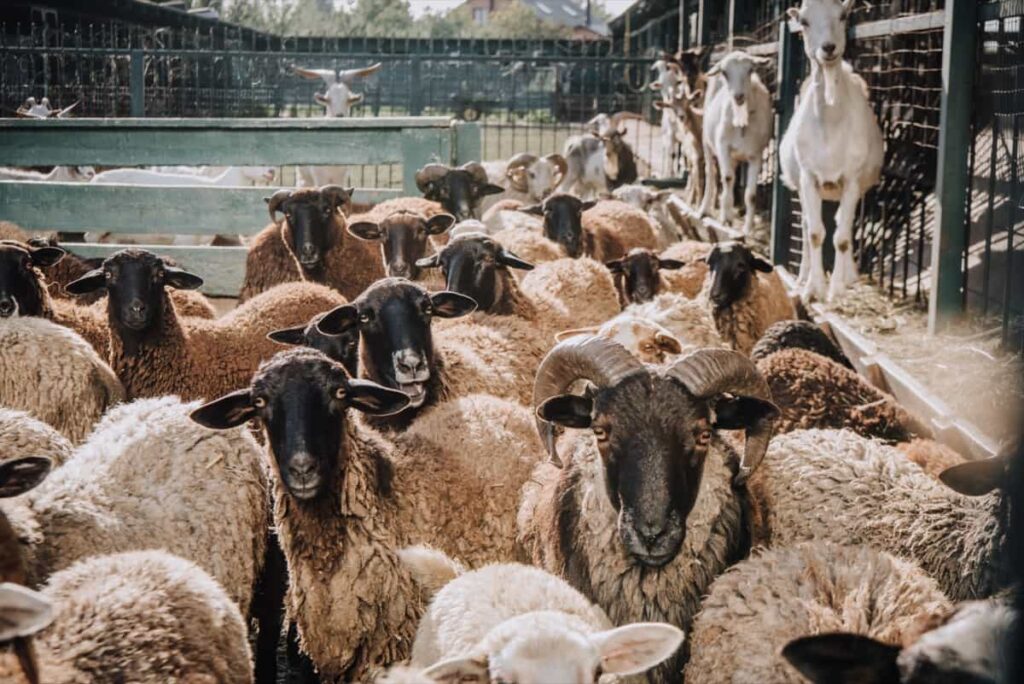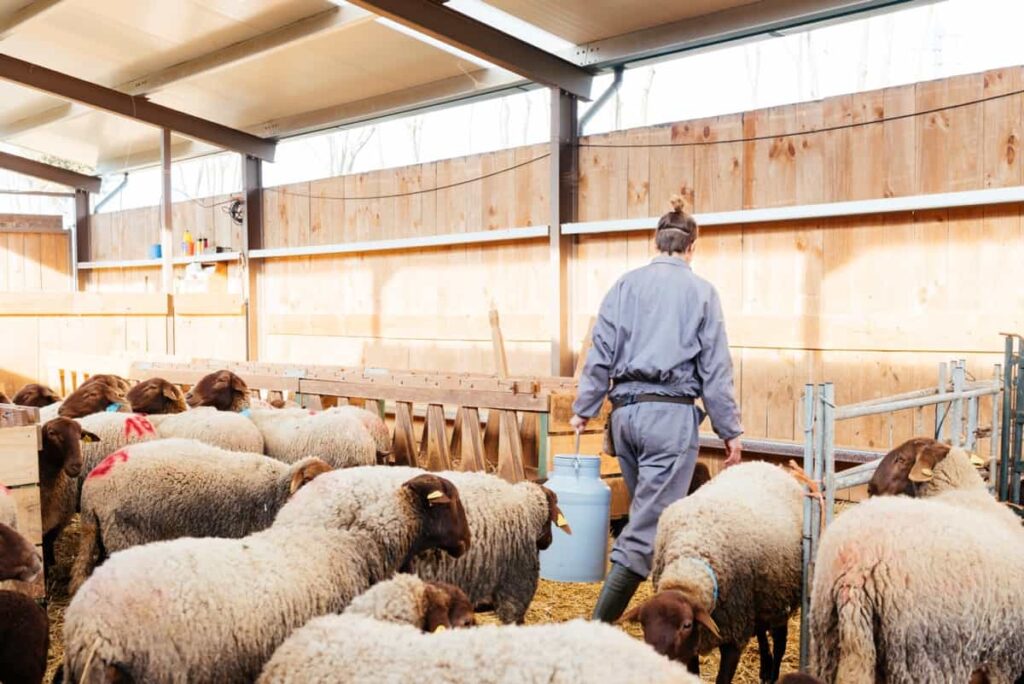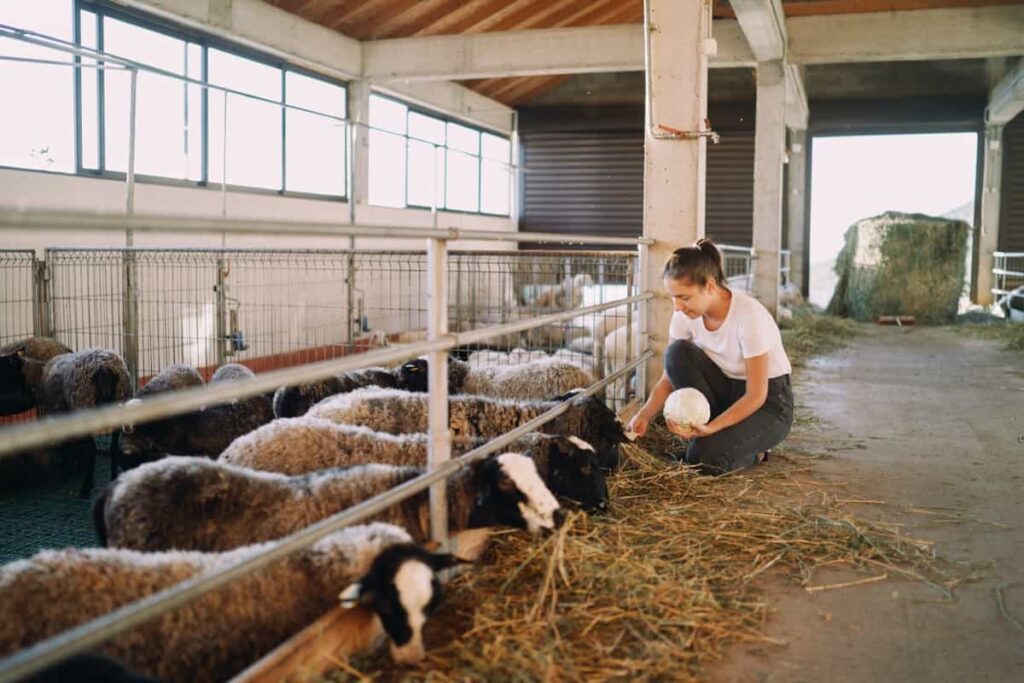With its low initial investment and high profitability potential, sheep farming offers a rewarding business opportunity that is both fulfilling and sustainable. Sheep farming is an agricultural venture that involves raising sheep for various purposes, such as meat, wool, and milk. Farmers breed and care for these animals to produce products used in diverse industries worldwide.

Setting Your Farming Goals and Objectives
When starting your sheep farming business, it’s crucial to set clear goals and objectives. This will guide your decisions and actions while keeping you focused on what you want to achieve. Consider what motivates you to venture into sheep farming. Determine how many sheep you plan to raise, the type of products you want to produce, and your target market.
Whether it’s increasing flock size or improving breeding techniques, having specific targets will keep you motivated and accountable for reaching your farming objectives. It is crucial to begin your sheep farming journey with a clear vision and specific goals in mind. These goals will guide you through the decision-making process and help you stay focused on your long-term objectives.
Comprehensive Market Research and Target Audience
Understanding the demand for sheep products in your target market will help you tailor your production to meet consumer needs effectively. Finding a target audience is key to developing a marketing strategy that resonates with potential customers. Knowing who you are selling to will guide your breeding and production decisions. Market trends and competitor analysis play a significant role in shaping your business approach.
Stay updated on industry developments and consumer preferences to stay ahead of the competition. By understanding the market landscape, you can position your sheep farming business for sustainable growth and profitability. Remember, knowledge is power when it comes to running a successful sheep farm. Conducting thorough market research ensures that you make informed decisions that align with consumer demands and industry trends.
Choosing the Right Sheep Breeds for Profit
Different breeds have unique characteristics that suit specific environments and market demands. Some popular options for beginners include Dorper and Katahdin sheep due to their adaptability and meat quality. If you’re looking to produce high-quality wool for sale, consider investing in Merino or Rambouillet sheep.
In case you missed it: Exploring Suffolk Sheep Disadvantages with Limitations and Challenges

These breeds are prized for their fine fleece and can make good prices in the market. On the other hand, if meat production is your main focus, Suffolk or Hampshire sheep may be more suitable due to their fast growth rates and superior meat quality. Research each breed’s growth rate, resistance to diseases, reproductive performance, and overall suitability for your farm.
Farm Infrastructure and Equipment Essentials
Adequate fencing is crucial to keep your flock safe and secure while grazing. Investing in sturdy shelters or barns will protect you from harsh weather conditions and predators. Additionally, ensure you have proper handling facilities such as chutes and pens for easy management of the sheep.
Investing in quality tools like shearing equipment, hoof trimmers, and medical supplies is necessary for day-to-day farm operations. To improve efficiency, consider implementing technology solutions like automatic waterers or tracking systems. Remember that a well-equipped farm ensures smooth operations and contributes to the overall health of your flock.
Detailed Feeding Programs and Nutrition Management
To meet their nutritional needs, sheep require a balanced diet of grass, hay, grains, and supplements. It’s essential to consult with a veterinarian or animal nutritionist to create a customized feeding plan based on the specific requirements of your sheep breeds. Regularly monitor their body condition score and adjust the feeding regimen accordingly.
Ensure access to clean water at all times, as hydration is key for digestion and overall well-being. Consider rotational grazing to manage pasture resources efficiently while promoting healthy grazing habits among your flock. Invest in high-quality feeders and troughs that are easy to clean and maintain hygiene standards. Track feed consumption patterns and make adjustments as needed based on seasonal changes or breeding cycles.
Health Management and Biosecurity Measures
Ensuring the health of your sheep is crucial for a successful farming business. Implementing biosecurity can help prevent the spread of diseases within your flock. This includes controlling access to your farm, monitoring visitors, and practicing good hygiene protocols. Regular health vaccinations are essential to keep your sheep in top condition.
In case you missed it: Ultimate Guide to Raising Texel Sheep: Farming Facts, Breed Profile, Uses, and Care

Maintaining clean living conditions and regularly disinfecting equipment can help reduce the risk of infections. To prevent disease transmission, quarantine new animals before introducing them to existing flocks. Stay informed about common illnesses in sheep and be prepared to address any potential outbreaks promptly.
Labor and Farm Management Techniques
Efficiently managing your workforce and daily operations is key to maximizing productivity and profitability. Hiring skilled employees who are passionate about animal care and farm work can significantly improve your farm’s overall performance. Implementing organized schedules for feeding, breeding, shearing, and other activities helps streamline operations and optimize efficiency.
Regular communication among team members fosters teamwork and enhances coordination on the farm. Utilizing technology such as automated feeding systems or digital record-keeping tools can simplify tasks, reduce manual labor, and improve data management accuracy. Implementation innovation is essential for staying competitive in the modern agricultural industry.
Financial Planning: Budgeting, Forecasting, and Funding
Budgeting allows you to allocate resources wisely, ensuring your farm operates efficiently. Forecasting helps you anticipate expenses and plan for potential challenges down the road. Before diving into financial planning, conduct thorough research on the costs involved in sheep farming.
Create a budget that outlines all your anticipated costs and projected income streams. When setting aside funds, be sure to account for seasonal fluctuations and unexpected emergencies. Explore different sources of funding, like loans, grants, or partnerships, to secure the capital for your farm. Regularly adjust your financial plans as needed to stay on track toward achieving profitability in your sheep farming venture.
Legal Considerations and Compliance Requirements
Various legal aspects must be considered, from obtaining necessary permits to adhering to local zoning regulations. The important aspect is ensuring that your farm meets all health standards set forth by regulatory bodies. This includes proper sanitation practices, disease control measures, and maintaining accurate records of vaccinations and treatments administered to the sheep.
In case you missed it: Valais Blacknose Sheep: Raising Facts, Profile, Characteristics, and Care

Additionally, familiarize yourself with any environmental regulations that may apply to your farm. Make sure you comply with minimum wage requirements, provide a working environment, and follow all employment regulations. Sheep are known for their versatility and ability to thrive in different climates, making them ideal livestock for both small-scale and large-scale operations. This versatile livestock can thrive in various climates and terrains, making it a valuable asset for farmers worldwide.
- Broccoli Varieties: Choosing the Right Cultivars for Your Farm
- How to Raise Pigs in Your Own Backyard: A Comprehensive Guide
- Budget Friendly Sheep Shed Ideas: Cheap and Low-Cost Tips
- How Much Do Cattle Farmers Make: Revenue Streams in Cattle Farming
- Management Pests and Diseases in Your Cotton Field
- Sheep Farming Business Plan for Beginners
- Aquaponic Farming at Home: A Step-By-Step Guide
- Profitable Village Farming Business Ideas in 2024
- High-Yield Aquaculture: Fast-Growing Fish for Farming
